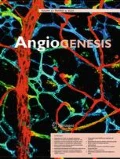Abstract
Anaplastic lymphoma kinase (ALK)/epidermal growth factor receptor (EGFR) co-alterations in adenocarcinomas are rare and no therapeutic consensus is reached. The potentially negative prognostic effects of programmed death-ligand 1 (PD-L1) expression on tyrosine kinase inhibitor (TKIs) efficacy further complicates the treatment options for patients with ALK/EGFR co-alterations and PD-L1 over-expression. We describe a case of advanced lung adenocarcinoma, harboring concurrent ALK/EGFR mutations and extremely high PD-L1 expression, that achieved sustained remission by the first-line treatment strategy of antiangiogenic therapy combined with chemotherapy. It is our firm conviction that the use anti-angiogenics should not have fallen out of favor in this era of targeted therapy and checkpoint inhibitors.



Data availability
The datasets used and/or analysed during the current study are available from the corresponding author on reasonable request.
Code availability
Not applicable.
Abbreviations
- NSCLC:
-
Non-small-cell lung cancer
- EGFR:
-
Epidermal growth factor receptor
- ALK:
-
Anaplastic lymphoma kinase
- EML4-ALK:
-
Echinoderm microtubule-associated protein-like 4-anaplastic lymphoma kinase
- VEGF:
-
Vascular endothelial growth factor
- TKIs:
-
Tyrosine kinase inhibitors
- PD-L1:
-
Programmed death-ligand 1
- MSS:
-
Microsatellite-stable
- TMB:
-
Tumor mutation burden
- ICIs:
-
Immune checkpoint inhibitors
References
Skoulidis F, Heymach JV (2019) Co-occurring genomic alterations in non-small-cell lung cancer biology and therapy. Nat Rev Cancer 19:495–509. https://doi.org/10.1038/s41568-019-0179-8
Yoneshima Y, Ijichi K, Anai S et al (2018) PD-L1 expression in lung adenocarcinoma harboring EGFR mutations or ALK rearrangements. Lung Cancer 118:36–40. https://doi.org/10.1016/j.lungcan.2018.01.024
Mazieres J, Drilon A, Lusque A et al (2019) Immune checkpoint inhibitors for patients with advanced lung cancer and oncogenic driver alterations: results from the IMMUNOTARGET registry. Ann Oncol 30:1321–1328. https://doi.org/10.1093/annonc/mdz167
Garassino MC, Cho BC, Kim JH et al (2018) Durvalumab as third-line or later treatment for advanced non-small-cell lung cancer (ATLANTIC): an open-label, single-arm, phase 2 study. Lancet Oncol 19(4):521–536. https://doi.org/10.1016/S1470-2045(18)30144-X
Sullivan I, Riera P, Andrés M et al (2019) Prognostic effect of VEGF gene variants in metastatic non-small-cell lung cancer patients. Angiogenesis 22(3):433–440. https://doi.org/10.1007/s10456-019-09668-y
Gomez DR, Blumenschein GR, Lee JJ et al (2016) Local consolidative therapy versus maintenance therapy or observation for patients with oligometastatic non-small-cell lung cancer without progression after first-line systemic therapy: a multicentre, randomised, controlled, phase 2 study. Lancet Oncol 17:1672–1682. https://doi.org/10.1016/S1470-2045(16)30532-0
Yang JJ, Zhang XC, Su J et al (2014) Lung cancers with concomitant EGFR mutations and ALK rearrangements: diverse responses to EGFR-TKI and crizotinib in relation to diverse receptors phosphorylation. Clin Cancer Res 20:1383–1392. https://doi.org/10.1158/1078-0432.CCR-13-0699
Huinen ZR, Huijbers EJM, van Beijnum JR et al (2021) Anti-angiogenic agents—overcoming tumour endothelial cell anergy and improving immunotherapy outcomes. Nat Rev Clin Oncol. https://doi.org/10.1038/s41571-021-00496-y
Funding
This work was supported by grants from the National Natural Science Foundation of China (Grant No. 81802984 project to Yuan Peng, Grant No. 81972851 project to Zhenzhou Yang and Grant No. 82002448 project to Xiaoyue Zhang).
Author information
Authors and Affiliations
Contributions
HH prepared the figures, collected the clinical data and wrote the report. WY and XZ collected the clinical data and provided the pathology results. YH contributed to clinical care of the patient. YP designed the study, analysed data, interpreted data and wrote the report. ZY designed the study, did the critical review and finalised the report. Written informed consent to publication was obtained.
Corresponding authors
Ethics declarations
Conflict of interest
The authors declare no competing interest for this work.
Ethical approval
Personal and clinical data were approved by the Ethics Committees of the corresponding institutions.
Consent to participate
Informed consent was obtained from the patient.
Consent for publication
The patient allowed the authors to publish anonymous data from her medical file.
Additional information
Publisher's Note
Springer Nature remains neutral with regard to jurisdictional claims in published maps and institutional affiliations.
Rights and permissions
About this article
Cite this article
He, H., Yang, W., Huang, Y. et al. Successful management of lung adenocarcinoma with ALK/EGFR co-alterations and PD-L1 over-expression by bevacizumab combined with chemotherapy. Angiogenesis 25, 5–8 (2022). https://doi.org/10.1007/s10456-021-09811-8
Received:
Accepted:
Published:
Issue Date:
DOI: https://doi.org/10.1007/s10456-021-09811-8

